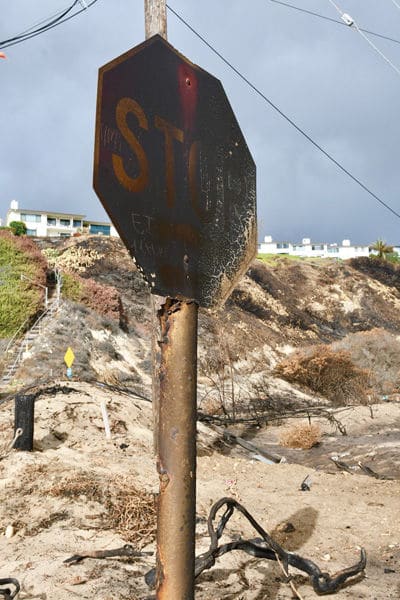
The number of Malibu Woolsey Fire victims who got any amount of government money from the Federal Emergency Management Agency (FEMA) seemed relatively minimal. Now we may know why.
Miles Taylor, a former chief of staff at the Department of Homeland Security (DHS) during President Donald Trump’s term who just endorsed former vice president Joe Biden for president, shed a little light on the inner workings of the federal government’s disaster response.
“The president wanted to exploit the Department of Homeland Security for his own political purposes, and to fuel his own agenda,” Taylor said in a testimonial video for the group Republican Voters against Trump.
Taylor recalled a phone call related to the California wildfires, during which Trump told FEMA officials to “stop giving money to people whose houses had burned down from a wildfire, because he was so rageful that people in the state of California didn’t support him and that politically it wasn’t a base for him,” the former staffer recalled. FEMA is the primary federal agency tasked with helping individuals, businesses, and public entities recover after a disaster.
Just days after this revelation was reported, Congressman Ted Lieu, who represents Malibu in the U.S. House of Representatives, led a coalition of 26 California-based House members is calling for an investigation into whether Trump improperly ordered wildfire relief withheld or delayed from California.
The 26 members signed and sent a letter to DHS Inspector General Joseph Cuffari on Aug. 21 that stated, in part, that, “The notion that the president made decisions about disaster assistance based on the political preferences of disaster victims is alarming and carries with it possible legal implications … Our constituents have suffered gravely from these fires and deserve to know whether any improper or illegal behavior has occurred.”
Soon after the Woolsey Fire was over, on Nov. 14, 2018, the government announced that federal FEMA funds were available. Malibu fire victims were urged to apply for FEMA Individual assistance—by phone, online or by speaking to actual FEMA representatives at the Malibu Disaster Recovery Center—as soon as possible. The disaster center kept regular hours for more than three months after the fire, until about mid-February 2019. Everyone who registered with FEMA was given a FEMA number, which was often the key to other kinds of assistance from various agencies and nonprofits.
FEMA Individual Assistance provides homeowners and renters with grant money and services when their property has been damaged or destroyed and losses are either uninsured or underinsured. The grants can pay for temporary living expenses, home repairs, replacement of essential household items and furniture, temporary unemployment, low-interest loans to cover losses and crisis counseling, if needed.
After all the hoopla of getting everyone to sign up for FEMA, as weeks and months went by after the fire, it seemed that few people that applied for FEMA grants got anything—at least out of the nonscientific sampling of dozens of fire victims interviewed during the first six months or so after the fire.
Many people were turned down by FEMA if they had any insurance at all, even if they were underinsured, and that actually went against the FEMA rules for qualification. In black and white, the agency’s policy states that fire victims who are uninsured or underinsured qualify for their help.
Was their decision to turn down the underinsured a way of giving out less money per Trump’s instruction?
In checking with FEMA’s Region 9 office, a spokesperson said a total of $4,152,016 was given out to Malibu-area applicants as part of the agency’s Individual Assistance program. Given that 473 single family homes were destroyed (not even counting homes that were not a total loss and individual rental units), it works out to about $8,000 per household.
According to the blog The Balance, the average claim payout from FEMA in late 2018 and early 2019 was closer to $30,000.
By Tuesday, Aug. 25, there had been no decision as to whether Cuffari’s office would be investigating FEMA’s practices following the Woolsey Fire, including the following questions posed by Lieu and his coalition of representatives:
– “Did the president or DHS officials improperly influence the issuance of any fire management assistance grant?”
– “Did the president or DHS officials improperly delay granting or deny any requests for an emergency or major disaster declaration?”
– “Did the president or DHS officials attempt to revoke or delay the distribution of any assistance that had already been granted to California fire victims?”
– “Did the president or DHS officials improperly deny requests from the State of California to adjust state and local cost share requirements associated with debris removal and emergency protective measures assistance?”